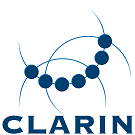Deep parsing: Difference between revisions
Appearance
No edit summary |
Marked this version for translation |
||
| (3 intermediate revisions by 3 users not shown) | |||
| Line 1: | Line 1: | ||
<languages> | <languages/> | ||
<translate> | <translate> | ||
<!--T:1--> | == Alpino dependency parser== <!--T:1--> | ||
<!--T:5--> | |||
Alpino is a hybrid parser based on a linguistic formalism. | Alpino is a hybrid parser based on a linguistic formalism. | ||
<!--T:2--> | <!--T:2--> | ||
*[https:// | *[https://github.com/proycon/alpino_clam_webservice Webservice Code] | ||
*[https://www.let.rug.nl/vannoord/alp/Alpino/ Project page] | *[https://www.let.rug.nl/vannoord/alp/Alpino/ Project page] | ||
<!--T:3--> | == UDpipe== <!--T:3--> | ||
<!--T:6--> | |||
UDPipe is a trainable pipeline for tokenization, tagging, lemmatization and dependency parsing of CoNLL-U files. UDPipe is language-agnostic and can be trained given annotated data in CoNLL-U format. | UDPipe is a trainable pipeline for tokenization, tagging, lemmatization and dependency parsing of CoNLL-U files. UDPipe is language-agnostic and can be trained given annotated data in CoNLL-U format. | ||
| Line 18: | Line 20: | ||
*[https://ufal.mff.cuni.cz/udpipe Project page] | *[https://ufal.mff.cuni.cz/udpipe Project page] | ||
</translate> | </translate> | ||
Latest revision as of 17:55, 13 November 2025
Alpino dependency parser
Alpino is a hybrid parser based on a linguistic formalism.
UDpipe
UDPipe is a trainable pipeline for tokenization, tagging, lemmatization and dependency parsing of CoNLL-U files. UDPipe is language-agnostic and can be trained given annotated data in CoNLL-U format.
